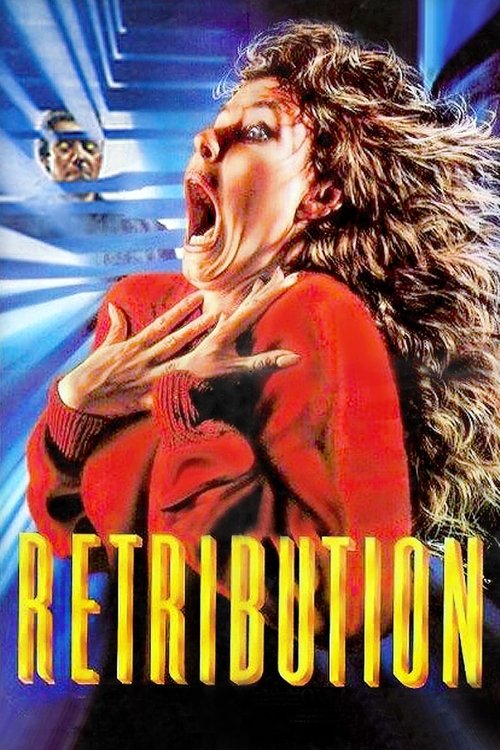Content Warning: The film discussed has suicide and graphic depictions of cow carcasses. There are several dogs in the movie, all of which survive.
George Miller is a struggling artist. Really struggling; as the movie opens, he’s standing on the roof of a run-down hotel, on Halloween, about to attempt suicide. As emergency responders break down the access door, he steps off the ledge and falls several stories to the ground. Paramedics, standing right there, manage to save his life.
It’s a grim start to a very eighties independent horror movie, something along the lines of Frankenhooker or The Re-Animator. Retribution is the work of director Guy Magar, who has made several films without major studio support. This is one of them. The movie is sometimes grim, often touching, and far more complex than you might expect. Panned by critics as being not scary enough or far too invested in the human side of horror, it’s a movie that’s still struggling to find its audience. But it found me, and I am glad it did.

This is George. George may look like a pervert here, but that’s really more of a Carry On thing.
In a 2012 interview with Fangoria, Guy Magar says: “The idea was to make a film that had great characters and a great story, and not just kill somebody every 10 minutes for no reason.” His models were not the slasher films — which were starting to lose some of their oomph by the late 80s anyway — but movies like Poltergeist or The Exorcist. In other words, movies that we might today call “elevated horror.”
Unlike elevated horror, Retribution was low-budget and has a real independent aesthetic. It has over-the-top horror set pieces and frankly cheesy practical effects. Just as a for-instance, there’s one great scene where a giant stone moai weeps great gouts of blood from its eyes. In another, a victim gets trapped inside a cow carcass in a butcher shop and is run through a saw-blade.
It’s also staffed with character actors whose faces might ring a bell, but only very gently. George Miller is played by Dennis Lipscomb, who might be familiar to some folks from his role in WarGames or to folk-horror fans for his work in Eyes of Fire. Mrs Stoller the landlady is played by Susan Peretz, who had many one-off television roles on shows like Barney Miller and Murder She Wrote, and was Al Pacino’s wife in Dog Day Afternoon. The most recognizable face has got to be Hoyt Axton, the songwriter many people only know as “the dad from Gremlins.” If you know that Jeremiah was a bullfrog, then you are familiar with Axton’s other work.

Axton has also never been to Spain, though he kinda likes the music.
I’ll try not to spoil the story too much, but Retribution follows the same vague storyline as Malignant. Unlike James Wan’s Giallo-wannabe, however, we spend little time in exposition. What we get instead is a very interesting, human-centered story about George’s torment—he immediately blames himself for the murders, even though he has no idea how he committed them—and the community of misfits and cast-offs who rally around George to try and help him through what seems like a really rough time.
And all of it told through a mechanism that feels more like an independent, low budget film than the high-brow seriousness of modern elevated horror. Retribution is not anywhere near as funny as Frankenhooker, but there’s plenty of comic relief, often played strongly toward familiar tropes and character archetypes. That’s a large part of what knocks the Oscar Nominee stink off the movie — the humor is broad, most of the characters shallow, and nobody is after that best actor statuette.

Have I mentioned this movie was made in the 80s?
Retribution follows plenty of horror tropes, but it ducks plenty others. When George wakes up in the hospital, he’s under the care of Dr. Curtis (Leslie Wing). Curtis is dating another doctor, the Dickensian-ly named Dr. Falconer, and you would be forgiven for expecting a love triangle between Curtis, Falconer, and George. Instead, Curtis’s subplot centers psychiatric ethics.
George’s love interest is Angel (Suzanne Snyder), who is the model “hooker with a heart of gold.” George seems to accept her entirely as she is; the typical “Roxanne” bit never materializes. And while Angel takes George to see the character you could reasonably expect to be the Magical Negro, that really doesn’t play out the way we expect.

Have I mentioned this movie was made in the 80s?
Some reviewers thought it wasn’t scary enough. Others complained the plot seemed to meander a lot. Retribution has only some of the horror beats, but every scene served the plots or subplots. The movie is tight, and better at exploring (and interleaving) the human themes of isolation, poverty, and solidarity than critical darling Hereditary, which sets up a complex story about dysfunctional families only to undercut all of it in the last act of the film.
Retribution was a blind buy for me direct from Severin, who put together a luxurious three-disc collection featuring the theatrical release, a longer Dutch cut, and the soundtrack on a CD. As of this writing, it’s also available to stream on Tubi. If you’re a fan of 80s horror—especially the independent production kind—this one is well worth your time. It’s quickly become one of my favorites.

Have I mentioned this movie was made in the 80s?

